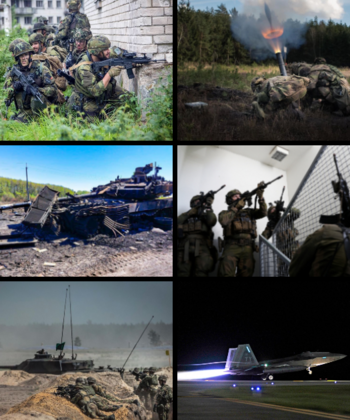Midsummer War
| Midsummer War | |||||||
|---|---|---|---|---|---|---|---|
 Clockwise from top: Æþurian infantry during the initial invasion; A Shalumite mortar fires on Æþurian positions; Acrean troops in urban combat in Gryten; An Acrean JAS-62 takes off at night; Shalumite infantry holding a defensive line; A destroyed Drazhin tank near Osovi. | |||||||
| |||||||
| Belligerents | |||||||
|
Coalition |
Drazhinskiya | ||||||
The Midsummer War, also referred to as the Iron Island Conflict, was a major conflict fought between Shalum, Acrea, and Æþurheim (Aethurheim). The war took place from 21 June to 11 July 2015, following heightened tensions and a prolonged military buildup in the aftermath of a breakdown in high-level talks concerning a dispute over the treatment of peoples in Maldoria and its status as former Æþurian and Svinian territory.
Since the start of the modern period, the territory of Maldoria has served as a deep source of enmity between Shalum and its neighbouring states to the south. Shalum-Aethurian contention over Maldoria is driven primarily by revanchism, as the resource-rich region was once partially owned by Aethurheim. Aethurian political rhetoric emphasises this historical claim, as well as highlights unequal Shalumite treatment of Maldoria's native slavic population. The latter point began to serve as justification for the former in Aethurian political rhetoric, and was subsequently adopted as a matter of foriegn policy by modern Aethurian governments in an effort to bring Shalumite domestic policy in Maldoria to major international attention. Criticism of such domestic policy generally focuses on the heavy securitisation of Maldoria, which is considered generally unstable thanks to a persistent low-level insurgency by Maldorian armed groups against Shalumite authorities, and its effects on the civilian population. Additionally, criticism is leveled at the high levels of inequality in Maldoria, and accusations of exploitation of the local population for their labour in gathering the region's immense amount of natural resources. Criticism against Aethurheim's role in Maldoria often comes in the form of persistent allegations of a hidden agenda for the province, as well as accusations of clandestine Aehturian material support to Maldorian insurgents. The Vocht administration engaged the Shalumite government in negotiations seeking to reduce the securitisation of Maldoria in mid-2013.
Aethurheim began a military buildup in December 2014, while still in the midst of heated negotiations with Shalum. As talks progressed into 2015 they began to devolve, beginning a reciprocal diplomatic escalation of tensions which came to a head when Supreme Chancellor Karlos Vocht abruptly ended negotiations at the beginning of May 2015. Although Shalum had been building up its own forces for several months as a precaution since January, Acrea had refrained from deploying further substantial numbers of troops to Shalum in the hopes of not escalating tensions.
The failure of the initial Aethurian invasion was largely attributed to critical miscalculations by Aethurian leadership. Vocht believed that the invasion would be capable of inflicting enough shock on the Shalumite defence that it would be able to occupy the entire island within days, and thus little accommodation was made for supporting sustained combat operations. Likewise, he believed that the relative isolation of Iron Island and the rapidity of a presumed Aethurian victory would mean that the Acreans would either decide not to intervene in strength, or if they did that they would be unable to mobilise enough forces fast enough. Vocht believed that by seizing Iron Island, he could force Shalum into ceding the territory of Maldoria. The defeat caused Vocht to resign, paving the way for Monika Schefer to replace him.
The conflict subverted expectations of how a war between the belligerents would play out. Most obvservers assumed that any conflict between the belligerents involved would result in a large-scale war of attrition, following the example set by the earlier Zemplen War which it has often been analysed alongside. By contrast, the fast pace of operations and dominance of technology and maneuver surprised observers. Analysis laid the blame for the defeat on a number of factors, including critical misperceptions and institutional problems that handicapped both the Aethurian and Drazhin militaries. Criticisms have been leveraged at both sides, especially in the Aethurian treatment of Shalumite civilians on Iron Island and the collateral damage resulting from the Acrean-led bombing campaign over Aethurheim.